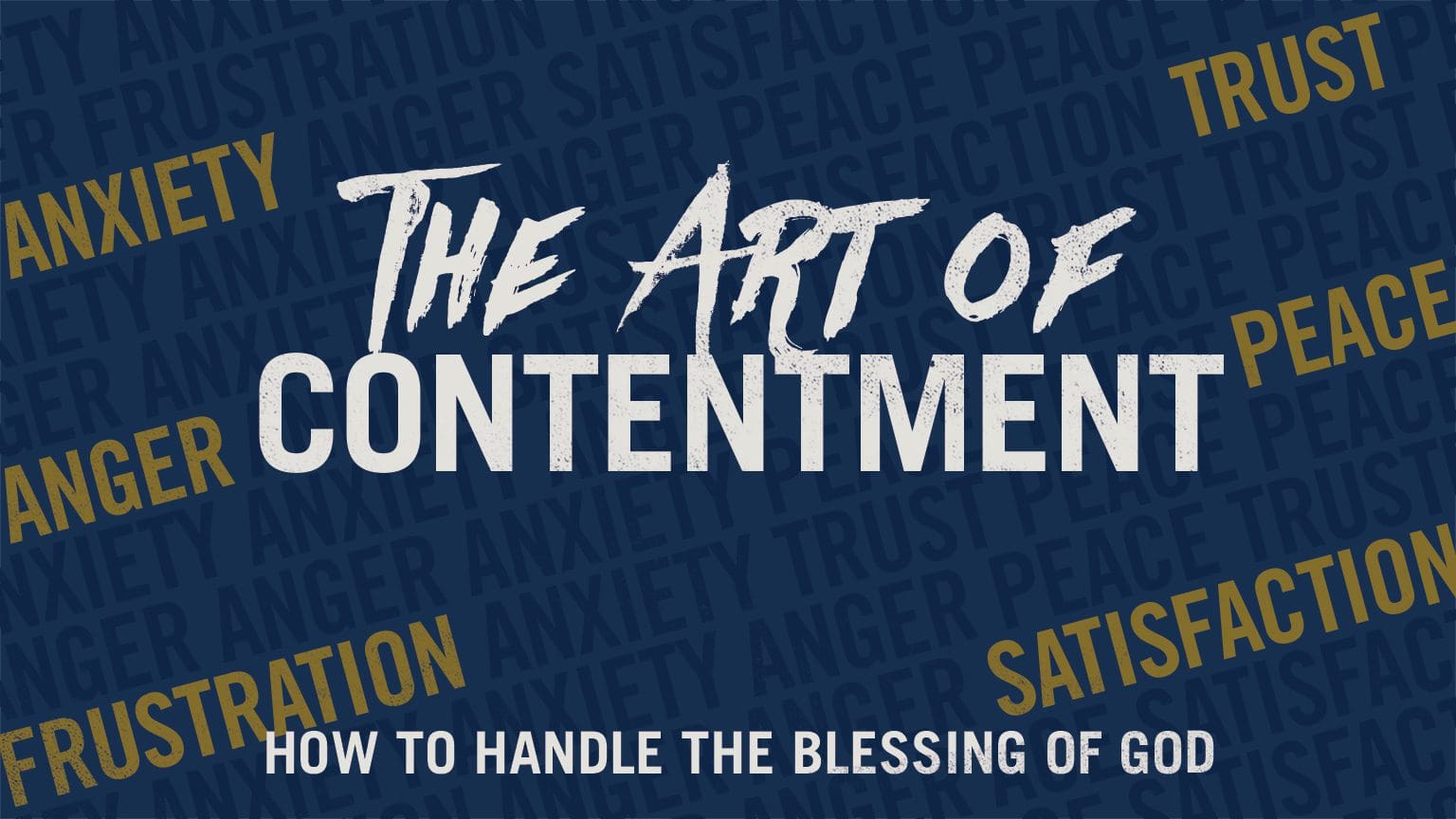I have learned in whatever situation I am to be content. I know how to be brought low, and I know how to abound. In any and every circumstance, I have learned the secret of facing plenty or hunger, abundance and need. I can do all things through him who strengthens me. (Philippians 4:11-13)
What we have here are the words of personal testimony. Paul refers to himself and to his own experience five times in three verses, and he does it without the faintest hint of pride. This is the language of personal experience, “Here is what I have found in my life. Here is what I have proved in my journey, and what has been true for me can be true for you as well.”
Paul had experienced the best and the worst of life in this world.
He knew what it was to be ‘brought low’ and he knew what it was to ‘abound.’ He knew what it was to have ‘plenty’ and he knew what it was to be in ‘need.’ Paul had experienced life at the top and life at the bottom.
You may find yourself saying, “I don’t think I have been either of these places. My life has been lived somewhere in the middle.” If that is your experience, be very thankful, because
there are special temptations that come with when you have plenty and there are special trials when you are in need.
In the book of Proverbs we read: “Give me neither poverty nor riches; feed me with food that is needful for me, lest I be full and deny you and say, “Who is the Lord?” or lest I be poor and steal and profane the name of my God” (Prov. 30:8-9). Paul knew the full range of human experience and he says, “In every circumstance, I have learned to be content.”
Contentment is a grace learned over time.
I have learned in whatever situation I am to be content… I have learned the secret of facing plenty and hunger, abundance and need. (Phil. 4:11-12)
The implication of the word ‘learned’ is that it was not always like this for Paul. He grew in contentment over time. It did not come quickly and it did not come easily, but there was growth and there was progress for him, and the same can be true for us today.
What is this secret that Paul learned about contentment? And how did he learn it? Is it possible for us to learn it today? Here are three observations. The first comes from the context of these verses…
Gratefully Savor the Blessings of Christ
Whatever is true, whatever is honorable, whatever is just, whatever is pure, whatever is lovely, whatever is commendable, if there is any excellence, if there is anything worthy of praise, think about these things. (Phil. 4:8)
God has given you the ability to choose where you focus your attention. What are the good things about your family? What are the good things about your church, your work, your neighborhood? Bring these to mind, especially when you are inclined to complain, and as you do, you will learn to be content.
Make more of your joys than you do of your sorrows. Make more of your gains than you do of your losses. Do this in your thinking, in your speaking, and even in your praying, and you will grow in contentment. I’ve included praying here because of what Paul says, “Do not be anxious about anything, but in everything by prayer and supplication with thanksgiving let your requests be made known to God” (Phil. 4:6).
If you do this, “the peace of God… will guard your hearts and your minds in Christ Jesus” (4:7). So bring your requests to God. But if your prayers are only a long list of requests, your praying will not bring you peace. All you are doing is filling your mind with problems in the presence of God.
Don’t let your prayers become an exercise in worrying on your knees! Bring to mind the blessings of God in your life. Give thanks for all Christ has done for you and for all that you are in him. Bring your requests to God, with thanksgiving, and the peace of God will guard your heart and mind.
Luther has a wonderful comment about “the rhetoric of the Spirit” (Rhetoric relates to speaking, and so “the rhetoric of the Spirit” is Luther’s way of describing how the Holy Spirit speaks) “If a cross comes, to make the cross but little, but if there is a mercy, to make the mercy great.” [1]
The Devil has a different way of speaking, “If there is a cross, the Devil makes it greater than it is, and so brings discontent. And if there is a mercy, it is the rhetoric of the devil to make the mercy less. ‘Aye, indeed,’ [the Devil] says, ‘the thing is a good thing, but what is it? It is no big deal.’” [2]
When you are listening to music, you have some choices as to how it will sound. You can turn up the treble or you can turn up the bass. The music is the same, but it will sound quite different depending on the settings that you choose.
Turn up the ‘mercies’ in the music of your life. The rhetoric of the Spirit magnifies your mercies! A person who is filled with the Holy Spirit makes more of their blessings than they make of their sorrows.
This does not mean pretending that your sorrows do not exist. But when you have suffering and pain in one area of your life, you can put it alongside another area where you have been especially blessed. So for example, you may say, “I have a really difficult job, but thank God, I also have a really wonderful church!” “I am struggling with this pain in my body, but thank God, he has given me a healthy mind!”
Jeremiah Burroughs applies this particularly to the anxiety of parents over a rebellious son or daughter: “It may be that God has afflicted you in one child, but he has been merciful to you in another child: Set one against the other.” [3]
David knew great sorrow over one of his sons, Absalom. Absalom led a rebellion against his father David, and it ended in Absalom’s untimely and tragic death. The Bible records David’s pain and anguish over his rebel son: “O my son Absalom, my son… Would I have died instead of you” (2 Sam. 18:33).
But God gave David another son, Solomon, who was a blessing and joy to his father’s heart.
Burroughs makes the point that it would have helped David in his sorrow, if when he had said, “O my son Absalom, my son…” he had also said, “O my son Solomon, my son…”
Regular participation in worship fosters contentment, because in worship we call to mind the mercies of God and gratefully savor the blessings of Christ.
Confidently Affirm the Sufficiency of Christ
I can do all things through him who strengthens me. (Phil. 4:13)
Look at these verse closely and you will see that Paul connects the secret of contentment with the strength he receives from Christ: “I have learned the secret of facing plenty and hunger, abundance and need” (4:12). Okay Paul, tell us. What is the secret? “I can do all things through him who strengthens me” (4:13).
There is a direct connection between these verses and another place where Paul gives insight into his own personal journey, “a thorn was given me in the flesh” (2 Cor. 12:7). A thorn in the flesh clearly is something that was very painful that Paul carried in his life. It was always with him. He could never get away from it. And Satan used this to get at him. Paul says, “Three times I pleaded with the Lord about this, that it should leave me” (12:8).
Here we come to something important about contentment. Contentment does not mean that you are indifferent to your circumstances. Contentment does not mean that you give up on trying to make things better. It is not throwing up your hands and saying, “Whatever will be, will be.” That is not contentment.
Karl Marx said, “Religion [by which he meant Christianity] is the opium of the people.” His critique was that if you tell people to be content, you take away any incentive to improve their position. Martyn Lloyd Jones talks about how large numbers of people “feel that the Christian gospel has been a hindrance to the forward march of mankind, that it has been a drag on progress, that it has been nothing but the dope of the people.” [4]
The answer to this is that Christian contentment does not mean that you are indifferent to your circumstances. Paul had a thorn in the flesh, and he wanted to get rid of it. He said, “I would really like this to be different, so here is what I am going to do. I am going to give myself to intercession.” When he pleaded with the Lord, he was seeking a change in regard to the trouble that had plagued him.
Jerry Bridges helpfully points out Paul’s advice: “Were you a bondservant when called? Do not be concerned about it. (But if you can gain your freedom, avail yourself of the opportunity)” (1 Cor. 7:21). Paul doesn’t say, “If you’re a bondservant, just accept it. Put up with it.” No! If you can change your position for the better, by all means, do it! Do all you can to make your life better.
Contentment does not mean that you are indifferent to your circumstances. It means that you are not controlled by your circumstances. Paul is not saying, “I don’t care whether I have an abundance or am in need.” He is saying, “My joy does not depend on it.”
Paul did everything he could with regard to this thorn in the flesh. He gave himself to prayer (and no doubt to fasting), and he did this three times—which I take to mean—over three different seasons in his life.
God gave him an answer: “My grace is sufficient for you, for my power is made perfect in weakness” (2 Cor. 12:9)Now coming back to Philippians, Paul says the same thing: “I can do all things through him who strengthens me” (4:13). Christ gives me the strength to face what he calls me to do. His grace is sufficient!
Paul says, “This is how I learned to live with the thorn in the flesh!” I discovered the sufficiency of Christ, and this is the secret of being content in any circumstance of life! I can do all things through Christ who gives me strength.
Christ gives me strength. There is an infusion of strength that comes from Christ into the life of the believer that matches the load he has given you to carry. God can double your load and triple your strength. [5] This is why Paul says, “I can do all things through [Christ] who gives me strength.”
We said that contentment is a journey from anger to peace, from frustration to satisfaction, and from anxiety to trust. The journey from anxiety to trust is right here: Anxiety is anticipating a problem without the strength that Christ will give you to meet it.
A friend is diagnosed with a serious illness, you hear the news, and you say, “I don’t think I could handle that.” You begin to notice the burdens other people carry and you say you yourself, What would I do if that happened to me? What are you doing? You’re anticipating a problem without the strength that Christ gives to those who go through this situation.
Here’s how you move from anxiety to trust: You confidently affirm the sufficiency of Jesus Christ: “Christ gives me strength.” He will give you the strength that you need for whatever you have to face, and he will do it at exactly the right time.
Corrie Ten Boom tells a story from her childhood in her book The Hiding Place. She had gone to visit the home of some friends where someone had died. So for the first time she is brought face-to-face with death.
When she got into bed that night she was quite terrified by the thought of what would happen to her if her father should die: “That night, as [my father] stepped through the door, I burst into tears. ‘I need you!’ I sobbed. ‘You can’t die! You can’t!’
Father sat down on the edge of the narrow bed, ‘Corrie,’ he began gently, ‘when you and I go to Amsterdam – when do I give you your ticket?’
I sniffed a few times considering this. ‘Why, just before we get on the train.’
‘Exactly. And our wise Father in heaven knows when we’re going to need things too. Don’t run out ahead of Him, Corrie. When the time comes that some of us have to die, you will look into your heart and find the strength that you need, just in time.’” [6]
Here is the Christian answer to anxiety, worry, and fear: Jesus Christ will give you the strength that you need to face whatever he calls you to face, and he will give it to you just when you need it.
Gladly Embrace the Supremacy of Christ
For to me to live is Christ, and to die is gain. (Phil. 1:21)
Martyn Lloyd-Jones says about Paul’s contentment, “If we want to feel as Paul felt, we must live as Paul lived.” [7] Here is how Paul lived: “For me to live is Christ, and to die is gain.” Could you say that? Think about this with me. How would you complete this sentence: “For me to live is and to die is .”
What would you put in the first blank? For me to live is work? Family? Ministry? Sports? Music? Whichever of these you put in the first blank, there is only one word that can go in the second blank, and that is “loss.”
If for you, to live is work, family, business, sports, music, or even ministry, then to die is always loss, because it means the end of the thing you have lived for. But if you can say, “For me to live is Christ,” you can also say, “to die is gain,” because when you die you get more of the Christ you lived for!
Paul was in prison when he wrote this, and he was facing the possibility of a violent death: “Even if I am to be poured out as a drink offering upon the sacrificial offering of your faith, I am glad and rejoice with you all” (Phil. 2:17). How could Paul be content in the light of this?
He was living for Christ and dying meant getting more of him!
If you want to feel what Paul felt, you must live as Paul lived: “For me to live is Christ! And this Christ gives me strength. That’s why, whatever happens, I have learned to be content.”
How sad it would be if your joy, your peace depended on holding onto something that you have or on getting something that you do not have. How free and confident and happy you would be if you could say, “I have learned in whatever situation I am to be content!”
The first step on the road to contentment
When Paul says, “I know how to be brought low and I know how to abound,” you know that he learned this from Jesus. Talk about knowing how to abound – Jesus was in very nature God! All that belonged to God was his. Everything God is, Christ is.
But the Son of God, who knew how to abound, emptied himself and took the form of a servant. He humbled himself and became obedient to death on a cross!
He was brought low. Jesus Christ went to the lowest point for you. But God raised him from the dead and highly exalted him, giving him the name that is above every name, that at the name of Jesus every knee should bow and every tongue confess that Jesus Christ is Lord to the glory of the Father.
Those who lose everything for him find that they gain everything in him. When you gratefully savor the blessings of Christ, confidently affirm the sufficiency of Christ, and gladly embrace the supremacy of Christ, then you will be able to say with Paul, “I have learned in whatever situation I am to be content! I can do all things through Christ who strengthens me!”
And those who lose everything for him find that they gain everything in him. Gratefully savor the blessings of Christ, confidently affirm the sufficiency of Christ, gladly embrace the supremacy of Christ, and you will be able to say more and more with Paul, “I have learned in whatever situation I am to be content. And here’s why: Because I can do all things through Christ who strengthens me!”
[1] Cited in Jeremiah Burroughs, “The Rare Jewel of Christian Contentment,” p. 155, Banner of Truth, 1964.
[2] Ibid., p. 156.
[3] Ibid., p. 175.
[4] D. Martyn Lloyd-Jones, “Spiritual Depression,” p. 279, Eerdman’s, 1997.
[5] Ibid., p. 63.
[6] Corrie Ten Boom, “The Hiding Place,” p. 31-32, Hendrickson, 2009.
[7] D. Martyn Lloyd-Jones, “Spiritual Depression,” p. 299, Eerdman’s, 1997.
[elementor-template id=”128476″]





